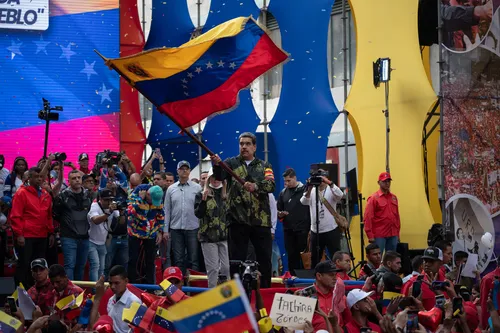
Even without a defined calendar, Venezuela’s election year experienced its first major moment on January 23, when Chavistas and opponents organized two street protests and already put the country in the mood for the presidential campaign.
The date marked 66 years since the end of the dictatorship of Marcos Pérez Jiménez, an anniversary that is claimed by both political forces that carried out acts. Chavistas took to the streets in greater numbers to defend Nicolás Maduro’s candidacy. The opposition’s strongest name is María Corina Machado, from Vente Venezuela. The ultraliberal, however, had her disqualification confirmed on January 26th by the Venezuelan court for 15 years and will not be able to run in the elections.
For sociologist and professor at the Central University of Venezuela (UCV) Atílio Romero, one of the problematic points of the opposition demonstration is the choice of location. “There are sectors of the opposition that say that if you want a democratic political outcome, you cannot use a space after a failed military coup like Altamira Square, and María Corina was there. The speech she assumes is that she will be a candidate anyway”, he told the Brazil in fact.
January 23 was also marked by Juan Guaidó’s attempted coup d’état in 2019. He proclaimed himself president, was recognized by the United States, then governed by Republican Donald Trump and, in Altamira square, called on the military to support his government .
Romero also states that the opposition arrives divided at the electoral process and the lack of unity is not only due to the candidate who will represent this bloc, but also in relation to a lack of well-defined strategy. “A part of the right is betting on a model that says that the Maduro government is already at an end and adopting a strategy of direct confrontation. The other side has a strategy of accumulating forces,” he said.
::What is happening in Venezuela?::
The sociologist also highlights that the division of the opposition should favor the government in the 2024 election. “What is the scenario that the government would supposedly seek? One is the fragmentation of the opposition and the other is an opposition that becomes radicalized and attracts attention. The economy, despite having high inflation, is stabilizing. What is certain is that the government will serve 25 years in power,” he said.
Strategies: streets, Justice and ballot boxes
For the rector of the National Experimental University Simón Rodriguez, Alejandrina Reyes, the organization of acts will be fundamental for the government and the Bolivarian revolution. According to her, the permanent mobilization strategy came from a vision of former president Hugo Chávez. “This permanent mobilization maintains control over the territory and the occupation of the streets is vital to this process implemented by the government,” she said to Brazil in fact.
This is also the opinion of the youth leader of the PSUV, the United Socialist Party of Venezuela, Jonathan Velasquez. To the Brazil in fact, He said that the government aims to keep militancy mobilized for massive population participation in the 2024 election. “I believe that the tools we will have and the demands that our population has are very clear. That’s why we work. First, listen to our bases and based on our bases, which is our people in general, work accordingly, but without neglecting the territorial, educational, social and political aspects”, he stated.
The opposition, in turn, despite mobilizing, faces legal problems. Former deputy María Corina Machado, the main name to be a right-wing candidate in the election, was sanctioned by the Comptroller General of the Republic (CGR) with a disqualification from holding public office due to inconsistencies in her reporting while she was a deputy in the National Assembly (2011- 2014).
The CGR confirmed in June 2023 that Machado was disqualified for 15 years. Even so, the ultraliberal ran in the opposition primaries in October and won the dispute, putting herself forward for the election. The TSJ Electoral Room confirmed the previous decision and suspended “all effects” of the primaries.
The opponent contests the process. In December 2023, María Corina appealed the decision, but the TSJ published the sentence this Monday, confirming the ultraliberal’s disqualification. In response, she said that she will run in the elections independent of the TSJ and called the trial a “judicial delinquency”. Corina received support from Paraguay, Argentina, Uruguay, Ecuador and the USA, which announced the resumption of sanctions after the TSJ decision.
External mediation
The government and the opposition signed an agreement in October 2023 in Barbados to define a schedule and technical issues for the 2024 elections. The meeting between the two parties defined that the election will be held in the second half of the year, but there is still no set date . The agreement also established that the European Union, UN (United Nations) and the Carter Center will send observation missions to monitor the vote.
Following the agreement, the US announced the largest blockade relief package since sanctions began on Venezuela. Among the measures, the South American country returned to trading oil, gas and gold, in addition to national bonds on the stock market. Venezuelan state airline Conviasa will also be able to fly to the US on repatriation missions.
However, in addition to resuming sanctions, the White House threatened not to renew relief for the oil and gas sector from April onwards if the government “does not comply with the agreement”. The government claims that it is respecting the agreement and that the elections should take place normally.
Editing: Lucas Estanislau
Source: www.brasildefato.com.br

